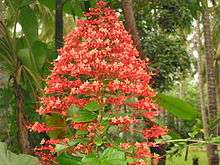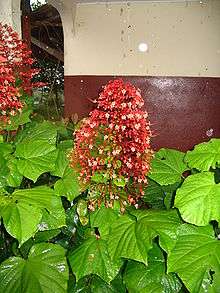Clerodendrum paniculatum
Clerodendrum paniculatum,[3] the pagoda flower, is a species of flowering plant in the genus Clerodendrum and family Lamiaceae. It is native to tropical Asia and Papuasia (southern China including Taiwan, Indochina, Bangladesh, Sri Lanka, Andaman & Nicobar Islands, Borneo, Sulawesi, Sumatra, Philippines, Bismarck Archipelago). It is reportedly naturalized in India,[4] Fiji, French Polynesia, and Central America.[1][5][6][7][8][9][10][11]
| Clerodendrum paniculatum | |
|---|---|
 | |
| Scientific classification | |
| Kingdom: | Plantae |
| Clade: | Tracheophytes |
| Clade: | Angiosperms |
| Clade: | Eudicots |
| Clade: | Asterids |
| Order: | Lamiales |
| Family: | Lamiaceae |
| Genus: | Clerodendrum |
| Species: | C. paniculatum |
| Binomial name | |
| Clerodendrum paniculatum | |
| Synonyms[1][2] | |
| |
Gallery
gollark: ```luathing:attribute { text_color = colors.green, "background_color", other_option = "whatever"}```would work, but looks weird and inconsistent.
gollark: It *should* work with the weird colony functions.
gollark: That passes a table to `sidebar:attribute`.
gollark: ```luasidebar:attribute { location = {0, 0, 2, 0}}```would work too.
gollark: That's an odd way to pass arguments which should probably be a table.
References
- Kew World Checklist of Selected Plant Families
- http://www.theplantlist.org/tpl/record/kew-42921
- Linnaeus C (1767) Mantissa Plantarum. Generum Editionis vi et Specierum Editionis ii. 90.
- Flowers of India
- Flora of China Vol. 17 Page 36 圆锥大青 yuan chi da qing Clerodendrum paniculatum Linnaeus, Mant. Pl. 90. 1767.
- Smith, A.C. (1991). Flora Vitiensis Nova. A new flora for Fiji (Spermatophytes only) 5: 1-626. Pacific Tropical Botanical Garden, Lawai.
- Turner, I.M. (1995 publ. 1997). A catalogue of the Vascular Plants of Malaya. Gardens' Bulletin Singapore 47(2): 347-655.
- Nelson Sutherland, C.H. (2008). Catálogo de las plantes vasculares de Honduras. Espermatofitas: 1-1576. SERNA/Guaymuras, Tegucigalpa, Honduras.
- Vikraman, R.R., Pandurangan, A.G. & Thulasidas, G. (2008). A study on the garden escaped exotics of Thiruvananthapuram district, Kerala. Journal of Economic and Taxonomic Botany 32: 765-781.
- Wearn, J.A. & Mabberley, D.J. (2011). Clerodendrum (Lamiaceae) in Borneo. Systematic Botany 36: 1050-1061.
- Davidse, G. & al. (eds.) (2012). Flora Mesoamericana 4(2): 1-533. Universidad Nacional Autónoma de México, México, D.F..
This article is issued from Wikipedia. The text is licensed under Creative Commons - Attribution - Sharealike. Additional terms may apply for the media files.

.jpg)


